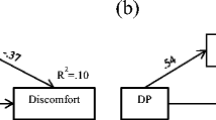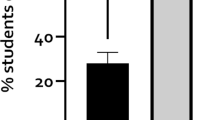Abstract
This paper looks at the impact of the Business & Society Course on student's attitude towards and awareness of both ethical and illegal behavior. Business students were surveyed on the first and last day of the semesters on 11 ethical and legal scenarios. The population included three sections of the Business and Society course and three sections of other business courses as a control group. Though generalizability is limited, the courses show some potential to positively impact student's attitudes.
Currently, ethics is of great concern at business schools in this country. Accreditation standards of both the AACSB and ACBSP both require an ethical component to a business curriculum as a condition of accreditation. A majority of business schools at both the undergraduate and graduate level have required or at least elective courses in ethics.
But how does this concern and use of resources translate into results? Do ethics courses change student attitudes? More specifically, do such courses have and impact on not only students' attitudes towards ethics but what impact, if any, do they have on students' awareness of both ethics and legality as well as their attitude towards violating the law?
Similar content being viewed by others
References
Ackoff, R. L.: 1987, ‘Business Ethics and the Entrepreneur’, Journal of Business Venturing 2, 185–191.
Ashton, R. H. and S. S. Kramer: 1980, ‘Students as Surrogates in Behavioral Accounting Research: Some Evidence’, Journal of Accounting Research 18, 1–15.
Barnett, J. H. and M. J. Karson: 1987, ‘Personal Values and Business Decisions: An Exploratory Investigation’, Journal of Business Ethics 6, 371–382.
Beggs, J. M. and M. S. Lane: 1989, ‘Corporate Goal Structures and Business Students: A Comparative Study of Values’, Journal of Business Ethics 8, 471–478.
Beltramini, R. F., R. A. Peterson and G. Kozmetsky: 1984, ‘Concerns of College Students Regarding Business Ethics’, Journal of Business Ethics 3, 195–200.
Bhide, A. and H. H. Stevenson: 1990, ‘Why Be Honest If Honesty Doesn't Pay’, Harvard Business Review (September-October), 121–129.
Blodgett, T. B.: 1968, ‘Showdown on Business Bluffing’, Harvard Business Review (May-June), 162–170.
Brabeck, M.: 1984, ‘Ethical Characteristics of Whistle Blowers’, Journal of Research in Personality 18, 41–53.
Buchholz, R. A.: 1989, Fundamental Concepts and Problems in Business Ethics (Prentice Hall, Englewood Cliffs, NJ).
Cavanagh, G. F.: 1990, American Business Values. 3rd ed. (Prentice Hall, Englewood Cliffs, NY).
Chamblis, L.: 1990, ‘Cheating Hearts’, Financial World 29 May, 60–61.
Churchman, C. W.: 1985, ‘Churchman's Conversations’, Systems Research 5, 257–258.
Clover, V. I. and H. L. Balsley: 1984, Business Research Methods. 3rd ed. (Wiley, New York).
Cronbach, L. J. and P. E. Meehl: 1995, ‘Construct Validity in Psychological Tests’, Psychological Bulletin 52, 281–302.
DeGeorge, R. T.: 1986, Business Ethics, 2nd ed. (Macmillan New York).
Drucker, P. F.: 1984, ‘The New Meaning of Social Responsibility’, California Management Review 26, 53–63.
Dubinsky, A. J. and J. M. Gwin: 1981, ‘Business Ethics: Buyers and Sellers’, Journal of Purchasing and Materials Management 17, 9–16.
Duizend, J.: 1991, ‘The Propensity of Small Business Owners to Engage in Illegal Practices in the Small Business Environment: An Inductive Study’, Southern Management Proceedings of the Annual Meeting in Atlanta, Georgia, November, 1991, by the Southern Management Association. Atlanta, Georgia: Southern Management Association, 1991.
Fernald L. W. and G. T. Solomon: 1988, ‘Comparisons of Entrepreneurs and College Business Student Values: A Preliminary Investigation’, The Journal of Private Enterprise 6(Fall), 133–143.
Ferrell, O. C. and L. G. Gresham: 1985, ‘A Contingency, Framework for Understanding Ethical Decision Making in Marketing’, Journal of Marketing 49, 87–96.
Fredrickson, J. W.: 1986, ‘An Exploratory Approach to Measuring Perceptions of Strategic Decision Process Constructs’, Strategic Management Journal 7, 473–483.
Gellerman, S. W.: 1986, ‘Why ‘Good’ Managers Make Bad Ethical Choices’, Harvard Business Review ( July-August), 85–90.
Gilligan, C.: 1982, In a Different Voice: Psychological Theory and Women's Development (Harvard University Press, Cambridge, MA).
Gordon, M. E., L. A. Slade and N. Schmitt: 1987,’ student Guinea Pigs: Porcine Predictors and Particularistic Phenomena’, Academy of Management Review 12, 160–163.
Grant, E. W. Jr. and L. S. Broom: 1988, ‘Attitudes Toward Ethics: A View of the College Student’, Journal of Business Ethics (August), 617–619.
Greenburg, J.: 1987, 'The College Sophomore as Guinea Pig: Setting the Record Straight, Academy of Management Review 12, 157–159.
Hawkins, D. I. and A. B. Cocanougher: 1972, ‘Student Evaluations of the Ethics of Marketing Practices: The Role of Marketing Education’, Journal of Marketing 36, 61–64.
Hegarty, W. H. and H. P. Sims, Jr.: 1978, ‘Some Determinants of Unethical Decision Behavior’, Journal of Applied Psychology 63, 451–457.
Internal Revenue Service: 1988, Income Tax Compliance Research: Gross Tax Gap Estimates and Projections for 1973–1992 (Government Printing Office, Washington, DC).
Jones, T. M. and F. H. Gautschi, II: 1988, ‘Will the Ethics of Business Change?’, Journal of Business Ethics 7, 231–248.
Kidder, L. H. and C. M. Judd: 1986, Research Methods in Social Relations, 5th edn. (Holt, Rinehart, and Winston, New York).
Kohlberg, L. H. and C. M. Judd: 1969, ‘Moral Stages and Moralization: The Cognitive-Development Approach’, in T. Lickona (ed.), Moral Development and Behavior: Theory Research, and Social Issues (Holt, Rinehard, and Winston, New York).
Lane, M. S. and S. Dietrich: 1989, ‘Ethics in Education: A Comparative Study’, Journal of Business Ethics 8, 943–949.
Martin, T. R.: 1981, ‘Do Courses in Ethics Improve the Ethical Judgment of Students?’, Business & Society 20, 17–26.
McCrae, R. R.: 1985, ‘Review of the Defining Issues Test’, in J. V. Mitchell, Jr. (ed.), The Ninth Mental (University of Nebraska Press, Lincoln), pp. 439–440.
McNichols, L. W. and T. W. Zimmer: 1985, ‘Situational Ethics: An Empirical Study of Differentiators of Student Attitudes’, Journal Business Ethics 4, 175–180.
Murray, T. J.: 1987, ‘Can Business Schools Teach Ethics’, Business Month 129, 24–26.
Norusis, M. J.: 1990, SPSS/PC+ 4.0 Base Manual (SPSS Inc., Chicago).
Nunally, J.: 1967, Psychometric Theory (McGraw Hill New York).
Payne, S. L.: 1988, ‘Values and Ethics-Related Measures for Management Education’, Journal of Business Ethics 7, 273–277.
Randall, D. M. and A. M. Gibson: 1990,’ Methodology in Business Ethics Research; A Review and Critical Assessment’, Journal of Business Ethics 9, 457–471.
Remus, W.: 1986, ‘Graduate Students as Surrogates for Managers in Experiments on Business Decision Making’, Journal of Business Research 14, 19–25.
Rest, J. R., D. Cooper, R. Coder, J. Masanz and D. Anderson: 1974, ‘Judging the Important Issues in Moral Dilemmas: An Objective Measure of Development’, Development Psychology 10, 491–501.
Rosenthal, R. and R. L. Rosnow: 1975, The Volunteer Subject (Wiley, New York).
Timmons, J. A.: 1990, New Venture Creation: Entrepreneurship in the 1990s. 3d edn. (Irwin, Homewood, IL).
Trevino, L. K.: 1986, ‘Ethical Decision-Making in Organizations: A Person-Situation Interactionist Model’, Academy of Management Review 11, 601–617.
Tsalikis, J. and O. Nwachukwu: 1988, ‘Cross-Cultural Business Ethics: Ethical Beliefs Difference Between Blacks and Whites’, Journal of Business Ethics 7, 745–754.
Vitell, S. J. and T. A. Festervand: 1987, ‘Business Ethics: Conflicts, Practices and Beliefs of Industrial Executives’, Journal of Business Ethics 6, 111–122.
Wood, J. A., J. Longenecker, J. A. McKinney, and C. W. Moore: 1988, ‘Ethical Attitudes of Students and Business Professionals: A Study of Moral Reasoning’, Journal of Business Ethics 7, 249–257.
Rights and permissions
About this article
Cite this article
Duizend, J., McCann, G.K. Do Collegiate Business Students Show a Propensity to Engage in Illegal Business Practices?. Journal of Business Ethics 17, 229–238 (1998). https://doi.org/10.1023/A:1017945925104
Issue Date:
DOI: https://doi.org/10.1023/A:1017945925104




